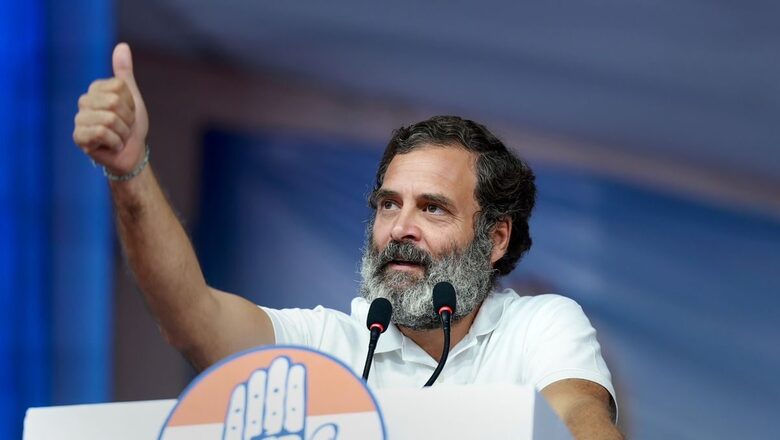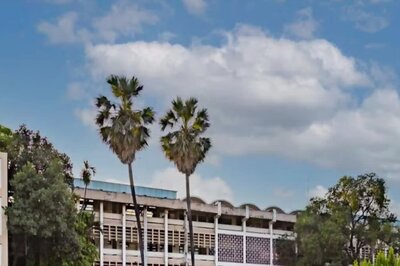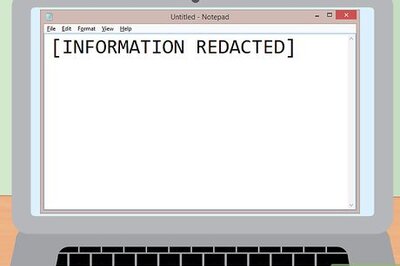
views
Rahul Gandhi has reportedly agreed not to target Hindutva icon VD Savarkar at the entreaty of Sharad Pawar and Sanjay Raut. Both the Nationalist Congress Party and the Shiv Sena [Uddhav Thackeray] pressurised Rahul not to attack Savarkar any further for the sake of opposition unity. However, the truce is unlikely to last long as Rahul is constantly itching to make a clear ideological distinction between the grand old party and the Hindutva brigade.
A quick recap of the RSS-Congress ties in post-Independence India is required, particularly for the benefit of young readers. Though the country’s first Prime Minister Jawaharlal Nehru was generally unsparing in criticising the Rashtriya Swayamsevak Sangh (RSS), he occasionally praised the Sangh Parivar, particularly when Pakistan attacked Jammu and Kashmir soon after Independence and RSS volunteers went there to help. During the Chinese aggression too, Nehru had acknowledged services rendered by the RSS.
There is a controversy regarding the RSS’s participation in the 1963 Republic Day parade. Author Dhirendra Jha contests this claim. It may have happened that the RSS volunteers were part of a massive citizens’ march at the Rajpath (now Kartavya Path) on January 26, 1963, when a bitter and somewhat humiliating Sino-Indian conflict had ended. Many citizens, running into thousands, participated in the Republic Day parade of 1963 to renew their resolve to safeguard India’s honour and integrity against Chinese treachery and aggression. Nehru and his cabinet colleagues, too, had led a contingent of Members of Parliament in the march.
Subsequently, on the political turf, both the 1977 and 1984-85 general elections established beyond doubt that the RSS was capable of taking tactical positions for the advancement of its larger political goals.
In 1977, the RSS directed the Jan Sangh to merge with an entity like the Janata Party that had a sizable presence of socialists and breakaway Congress factions. The idea behind the merger was to further the Sangh’s interests, both short-term and medium-term.
When the 8th Lok Sabha elections were announced in 1984, the country was passing through perhaps its biggest political turmoil since the Partition and Mahatma Gandhi’s assassination. The RSS supported a Congress that was led by a young man with little experience in politics or governance.
The move was significant on several counts. The Sangh’s new political entity, the Bharatiya Janata Party (BJP), was formed in 1980 and it was facing a major test during the 1984-85 polls. Kuppahalli Sitaramayya Sudarshan, later to become the sarsanghchalak (head) of the RSS, held that all political parties were equal in the eyes of the RSS as long as they served the broad Sangh agenda of cultural nationalism, swadeshi, and Hindu renaissance. This line of thinking was evident when, in 2018, current RSS supremo Vishnu Bhagwat was quoted saying, “These are [Congress-mukt Bharat] political slogans. It is not the language of the RSS. The word ‘mukt’ (free or liberated) is used in politics. We never use the language of excluding anyone.”
Bhagwat’s remarks at a book release function in Pune in 2018 generated considerable interest in political circles. In the context of Rahul’s frequent attacks on the RSS and his comparison of the organisation with Ikhwan Ul Muslimeen (Brotherhood), Bhagwat’s bid to engage Rahul was seen as a streak of realpolitik and an attempt to showcase the RSS as an organisation that welcomes criticism and advocates political inclusiveness. Incidentally, the RSS support for the Congress, days after Indira Gandhi’s assassination, was evident in an article authored by veteran Sangh ideologue Nanaji Deshmukh, published in the Hindi magazine Pratipaksh, which he ended with a call to bless and cooperate with Rajiv Gandhi when voting was less than a month away.
The young prime minister quickly announced general elections ahead of schedule between December 24 and 27, 1984. Rajiv’s election campaign was aggressive and focused on making Sikhs seeking a separate homeland a key issue. The hidden agenda was to somehow exploit Hindu insecurity and project the Rajiv-led Congress as their sole saviour. Rajiv had met Bhaurao Deoras, younger brother of Balasaheb Deoras, at least half a dozen times at different locations including 46, Pusa Road, New Delhi, the residence of family friend and alcohol baron Kapil Mohan, who died recently. Rajiv’s close associate Arun Singh, Delhi mayor Subash Arya, and liaison man Anil Bali were among those who were present. The buzz was that the RSS wanted Rajiv to open the locks of Babri Masjid-Ram Janmabhoomi and get clearance for Ramanand Sagar’s epic Ramayana on state TV Doordarshan.
Throughout his tenure as Congress president and Prime Minister, PV Narasimha Rao was accused of going soft on RSS. In fact, before Babri Masjid fell on December 6, 1992, Rao was in close touch with the top RSS leadership in order to find an out-of-court settlement of the vexed Ayodhya issue. When Professor Rajendra Singh, aka, Rajju Bhaiya took over as RSS chief in 1994, a section of the Congress whispered the joke: “Arrey, Rao Sahib phir reh gaye (Oh, Rao has missed the chance again).”
On a more serious note, a strong right-wing lobby in the Congress has survived for decades. Ravishankar Shukla, the premier of the Central Provinces and the first Congress chief minister of Madhya Pradesh, authored a two-part article, published in Kalyan in July-August 1947. The Congress stalwart had argued that “Hindustan should become a Hindu Rashtra and its state religion should be Hinduism. Hindus or non-Muslims should hold the top posts. Any person who does not believe in Hindu culture should not be made a part of the government of Hindustan.” Shukla, a member of the Constituent Assembly, had advocated that Muslims should not be given citizenship rights.
The time is ripe for Rahul Gandhi to look back and take a cue from how the Congress dealt with the issue of Hindutva and RSS in the past.
The writer is a Visiting Fellow at the Observer Research Foundation. A well-known political analyst, he has written several books, including ‘24 Akbar Road’ and ‘Sonia: A Biography’. The views expressed in this article are those of the author and do not represent the stand of this publication.
Read all the Latest Opinions here



















Comments
0 comment